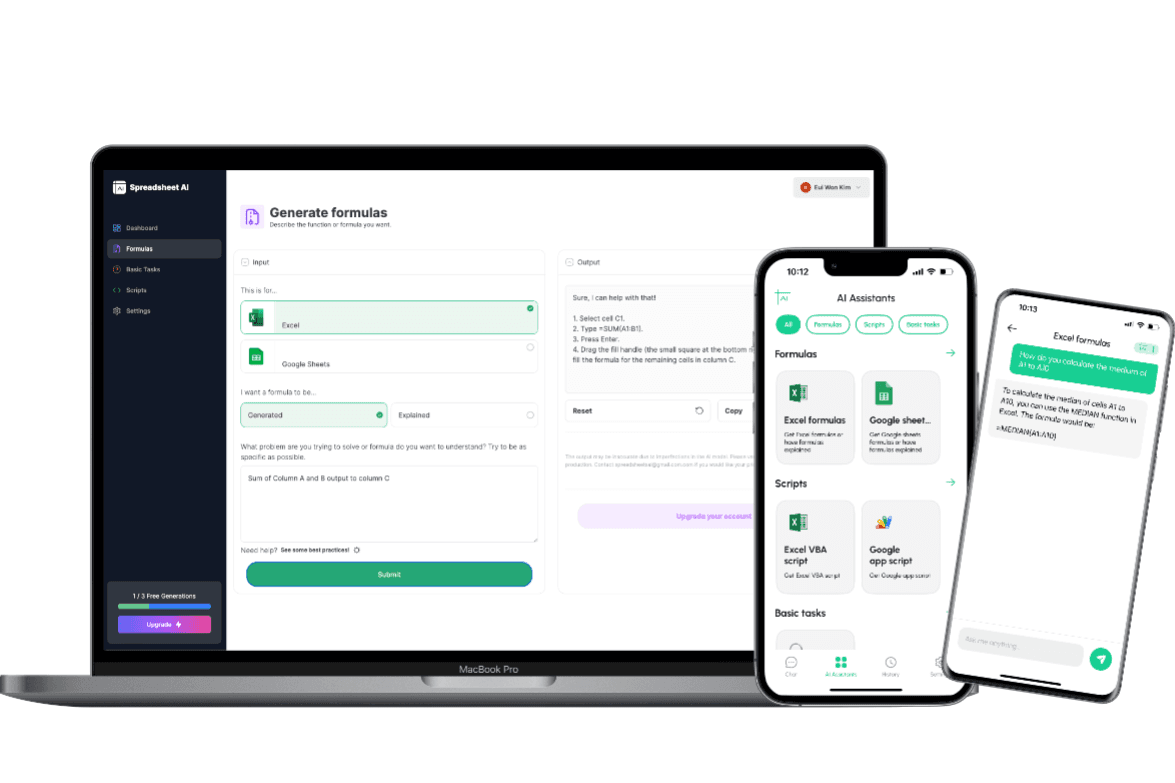Formula generator for CONCAT function
The CONCAT function is used to concatenate multiple strings into a single string. It takes two or more arguments and returns the concatenation of those arguments. The function is equivalent to using the `&` operator in Excel. The CONCAT function is useful for combining text values, such as names or addresses, into a single cell.
Formula generator
Spreadsheet AI is the #1 AI for generating and comprehending Excel and Google Sheets formulas. With its advanced capabilities, it goes beyond the basics by providing support for VBA and custom tasks. Streamline your spreadsheet with Spreadshee AI

How to generate an CONCAT formula using AI.
To obtain information on the ARRAY_CONSTRAIN formula, you could ask the AI chatbot the following question: “To get the CONCAT formula, you can ask the AI chatbot something like: "What is the formula to combine or concatenate text from multiple cells in Excel?"”
CONCAT formula syntax
The CONCAT function in Excel is used to combine multiple text strings into one. The syntax for CONCAT is: =CONCAT(text1, text2, ...) - text1, text2, ... are the text strings you want to combine. - You can include up to 255 text strings in the CONCAT function. - Each text string should be enclosed in double quotation marks or be a cell reference containing the text. For example, if you want to combine the text strings "Hello" and "World" into one, you would use the following formula: =CONCAT("Hello", "World") The result would be "HelloWorld".
Use Cases & Examples
In these use cases, we use the CONCAT function to combine multiple text strings into one. The CONCAT function helps us create a single text string by joining the contents of different cells or text values together.
Concatenating First and Last Names
Description
This use case demonstrates how to concatenate the first name and last name of a person to create a full name.
Result
CONCAT(A2, " ", B2)
Creating Email Addresses
Description
This use case shows how to create email addresses by concatenating the username and domain name.
Result
CONCAT(C2, "@", D2)
Generating Unique IDs
Description
In this use case, we generate unique IDs by concatenating a prefix with a sequential number.
Result
CONCAT("ID-", ROW())
AI tips
Enhance Your Excel Efficiency with AI Tips: Discover our innovative Excel add-in feature, ‘AI Tips.’ Streamline your workflow and boost productivity as AI-powered suggestions offer real-time insights for optimal spreadsheet organization, data analysis, and visualization. Elevate your Excel experience with intelligent recommendations tailored to your unique needs, helping you work smarter and achieve more.
Provide Clear Context
When describing your requirements to the AI, provide clear and concise context about the data you have, the specific task you want to accomplish, and any relevant constraints or conditions. This helps the AI understand the problem accurately.
Include Key Details
Include important details such as column names, data ranges, and specific criteria that need to be considered in the formula. The more precise and specific you are, the better the AI can generate an appropriate formula.
Use Examples
If possible, provide examples or sample data to illustrate the desired outcome. This can help the AI better understand the pattern or logic you are looking for in the formula.
Mention Desired Functionality
Clearly articulate the functionality you want the formula to achieve. Specify if you are looking for lookups, calculations, aggregations, or any other specific operations.
FAQ
Frequently Asked Questions
- The CONCAT function is used to concatenate, or join, multiple text strings together in Excel.
- To use the CONCAT function, you need to provide the text strings you want to concatenate as arguments within the function. For example, CONCAT(A1, B1) will concatenate the values in cells A1 and B1.
- Yes, you can concatenate multiple text strings by providing them as separate arguments within the CONCAT function. For example, CONCAT(A1, B1, C1) will concatenate the values in cells A1, B1, and C1.
- Yes, the CONCAT function can be used to concatenate text strings with numbers. However, the numbers will be treated as text in the resulting concatenated string.
- The CONCAT function has a limitation of 255 arguments. If you need to concatenate more than 255 text strings, you will need to use a different method, such as using the CONCATENATE function or the ampersand (&) operator.